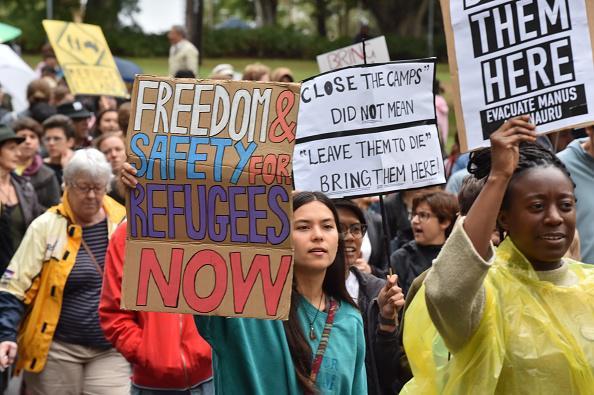Australia Refugee Crisis
Since 9/11, Australia has upheld a strict refugee and immigration policy known as the “Pacific Solution.” This policy prohibits any refugees or asylum seekers from stepping foot on the mainland, and instead transfers them to offshore detention centers while their claims as a refugee or an asylum seeker are processed. Three such detention centers exist: one on the Pacific island of Nauru, one on Papua New Guinea’s Manus Island and one on Christmas Island. These “processing” detention centers are specifically located on land that is not considered Australia, allowing the nation to shirk the responsibilities of the refugees under the U.N. Refugee Convention. The Australian military is responsible for intercepting migrant boats bound for Australia, where the migrants are then relocated to these camps. Australian leaders claim that this approach deters the dangerous sea crossings by the asylum seekers and refugees, as well as allowing the country to more closely monitor who comes into the country. However, the cruel and inhumane conditions of the camps (such as a lack of facilities, cramped conditions and unbearable heat with almost no available shade) have led to numerous protests across the country, as well as a possible court case by the ICC for crimes against humanity and violations of multiple conventions against torture. While Papua New Guinea’s Supreme Court has recently ruled the detention center on Manus Island as unconstitutional and ordered the camp closed, the Australian Supreme Court has ruled that the camps are legal, and it will likely remain open. Even if these centers are closed, the issue of settling refugees on the mainland and in normal lives remains.
- Amnesty International
- Australian Refugee Action Network
- Refugee Council of Australia
- Right Now
Links to additional relevant NGOs
Sources to Consult
Ideas for helping out with the issue
- 1) Participate in the protests held in major cities in the country. 2) Boycott companies that are benefitting from the detention centers. 3) donate clothes, food, money and other supplies to groups working with the detention centers for the asylum seekers
Testimonials
“They just want is to die. For the last three years we were under heavy, systematic torture (which) aim to force us to go back… Hundreds of us lost their minds completely. They want to force us to go back to our country, and then when we deny, we say we don’t want to go back because we don’t have safety, we will be killed, they tell us, okay, we will offer you resettlement in PNG. But the reality is in PNG there is no safety at all. We started to plead with them, we don’t want to go to Australia, please leave us or let other countries like New Zealand or Canada take us, but the Australian government is refusing those countries.” – Sudanese refugee Aziz Adam on Christmas Island detention center (http://www.cnn.com/2016/08/19/asia/manus-island-australia-closing-stories/) “My Mum passed away when I was in here, in this detention center. My sister got married, and I’m here. My step-mum got pregnant and the child died and I’m here. I have no feeling toward my family. They’ve been away from my eyes and my heart. If the Australian government, they want to make us engineers… they can do. But they didn’t chose this way, they just chose to kill us, to kill our feeling, to kill our dream, our future, to not be ambitious anymore. In cold blood.” – Lebanese refugee Ahmed Trad on detention center (http://www.cnn.com/2016/08/19/asia/manus-island-australia-closing-stories/) “A man told me about his pregnant wife who tried to hang herself because she couldn’t bear the thought of bringing another person into that world. I met children who had tried to kill themselves multiple times. The distressing and heartbreaking accounts of deteriorating mental health, discrimination and violent attacks, sexual violence, inadequate medical care and harassment that I heard from mothers, fathers, adults and children as young as six, paint a picture of people driven to absolute despair.” -Anna Neistat, Amnesty International, on her account of the 100 interviews of refugees from the detention camps (https://www.amnesty.org.au/island-of-despair-nauru-refugee-report-2016/)


